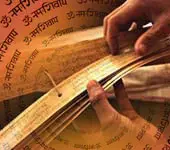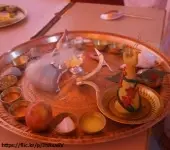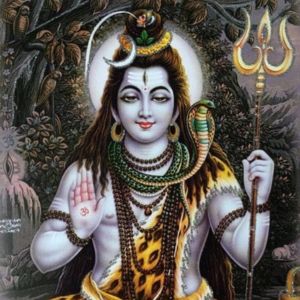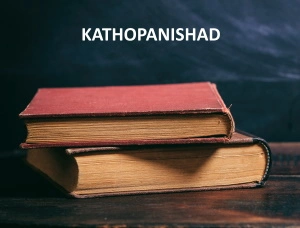Which Comes First, Night Or Day?
Only audio above. Video below.
Quiz
Who wrote Vedas?Transcript
(Click here to read more)
Nachiketas spent three days in Yamaloka without food. It was a dangerous situation. Yamadutas cautioned Yamaraja: taking care of a guest is not even by choice. If the unexpected guest goes back unattended, it spells disaster for the host. Yamaraja is aware of this. Yamaraja wants to compensate for this dereliction. He tells young boy Nachiketas. तिस्रो रात्रीर्यदवात्सीर्गृहे मे- ऽनश्नन् ब्रह्मन्नतिथिर्नमस्यः। नमस्ते�....
Transcript
(Click here)
Nachiketas spent three days in Yamaloka without food.
It was a dangerous situation.
Yamadutas cautioned Yamaraja: taking care of a guest is not even by choice.
If the unexpected guest goes back unattended, it spells disaster for the host.
Yamaraja is aware of this.
Yamaraja wants to compensate for this dereliction.
He tells young boy Nachiketas.
तिस्रो रात्रीर्यदवात्सीर्गृहे मे- ऽनश्नन् ब्रह्मन्नतिथिर्नमस्यः। नमस्तेऽस्तु ब्रह्मन् स्वस्ति मेऽस्तु तस्मात्प्रति त्रीन्वरान्वृणीष्व॥
You stayed for three nights here at my home.
Without food.
I want to make up for that. please ask for three boons from me.
Otherwise, I will be doomed.
Why?
We have seen this in the earlier episode.
The guest is fire.
Any guest is like fire.
He needs to be taken care of, pacified.
An unattended guest even if he is the calmest person in the world, most peaceful person in the world, he can burn down the house of the host.
Just for the mere reason that the host is not doing his duty.
You can not afford to be careless with fire.
Yamaraja is scared now.
He is trying to pacify Nachiketas.
Namasyaha - you deserve honor and respect.
Two times he addresses Nachiketas as brahman:
ब्रह्मन्नतिथिर्नमस्यः । नमस्तेऽस्तु ब्रह्मन् ॥
Yamaraja is eager that Nachiketas should not feel offended.
It is like saying: I am so sorry. I am so sorry, saying it again and again.
Here there is an interesting point.
Why is it that Yamaraja says that you have spent three nights at my place instead of saying three days?
There are two reasons.
In the Vedic system, night comes first, then day.
For the person who does Agni upasana, first is the evening homa then the morning homa.
If you are unable to do it for some time due to say impurity in the family and then have to restart; you should not start with the morning homa, you should start with the evening homa.
The first part is the evening homa the second part is the morning homa.
First night then day.
Importance is given to night.
In the same way, first comes Krishna paksha then comes Shukla paksha.
This is the Vedic system.
Another point is.
Uttarayana is daytime for Devas.
Dakshinayana is nighttime for Devas.
Dakshina means South.
South is the direction of Yama.
He resides in the south.
That's another reason night is important for Yama.
This concept is there throughout Vedic literature.
When Shringi curses Raja Parikshit, he says before the seventh night from now he will be killed by Takshaka.
Default is night, counting nights.
Recommended for you
Concept Of Taxation and Regulation Developed From The Vedas

This is the concept of both taxation and regulation. From the Vedas. Give wealth-creators freedom so that they can create wealth. But they should not ....
Click here to know more..Adhyatma Ramayana

Adhyatma Ramayana - its author, how is it different from Valmiki Ramayana, is it authentic?....
Click here to know more..Vishwanatha Ashtakam

gangaatarangaramaneeyajat'aakalaapam gaureenirantaravibhooshitavaamabhaagam. naaraayanapriyamanangamadaapahaaram vaaraanaseepurapatim bhaja vishvanaat....
Click here to know more..
English Topics
Kathopanishad
Click on any topic to open
- 13 What to Ask for if You Meet God
- 12 Nachiketas Responds To The Offer Of Yamaraja
- 11 Yamaraja Tries To Dissuade Nachiketas
- 10 Third Boon Of Nachiketas
- 9 How to attain absolute peace?
- 8 Extra Boon From Yamaraja To Nachiketas
- 7 Yamaraja Teaches Nachiketas About Swargya Agni
- 6 The Second Boon Of Nachiketas
- 5 The First Boon Of Nachiketas
- 4 Which Comes First, Night Or Day?
Please wait while the audio list loads..
30
Ganapathy
Shiva
Hanuman
Devi
Vishnu Sahasranama
Mahabharatam
Practical Wisdom
Yoga Vasishta
Vedas
Rituals
Rare Topics
Devi Mahatmyam
Glory of Venkatesha
Shani Mahatmya
Story of Sri Yantra
Rudram Explained
Atharva Sheersha
Sri Suktam
Kathopanishad
Ramayana
Mystique
Mantra Shastra
Bharat Matha
Bhagavatam
Astrology
Temples
Spiritual books
Purana Stories
Festivals
Sages and Saints

